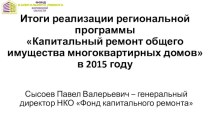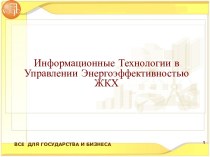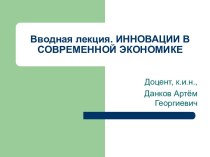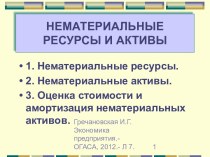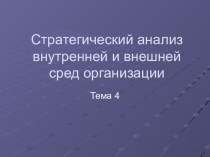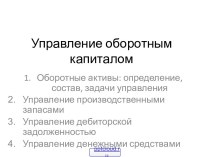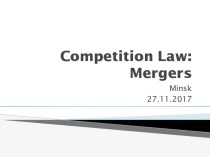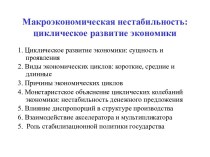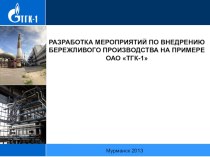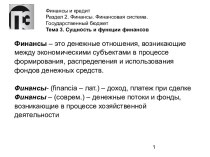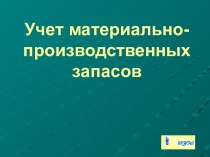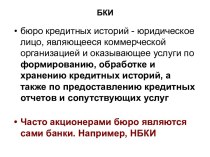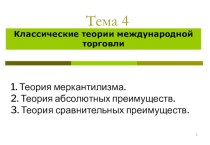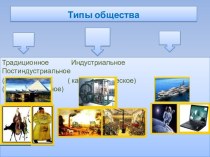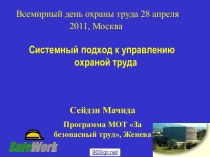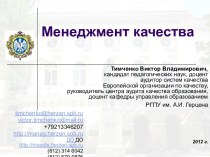- Главная
- Разное
- Бизнес и предпринимательство
- Образование
- Развлечения
- Государство
- Спорт
- Графика
- Культурология
- Еда и кулинария
- Лингвистика
- Религиоведение
- Черчение
- Физкультура
- ИЗО
- Психология
- Социология
- Английский язык
- Астрономия
- Алгебра
- Биология
- География
- Геометрия
- Детские презентации
- Информатика
- История
- Литература
- Маркетинг
- Математика
- Медицина
- Менеджмент
- Музыка
- МХК
- Немецкий язык
- ОБЖ
- Обществознание
- Окружающий мир
- Педагогика
- Русский язык
- Технология
- Физика
- Философия
- Химия
- Шаблоны, картинки для презентаций
- Экология
- Экономика
- Юриспруденция
Что такое findslide.org?
FindSlide.org - это сайт презентаций, докладов, шаблонов в формате PowerPoint.
Обратная связь
Email: Нажмите что бы посмотреть
Презентация на тему Structured products
Содержание
- 2. What are Structured ProductsStructured Product is a
- 3. DerivativesAn option gives its owner the right
- 4. Some Definitions
- 5. Types of Structured ProductsCPPI ( Constant Proportion
- 6. CPPI Constant Proportion Portfolio Insurance (CPPI)
- 7. CPPI-JargonFloor : Present Value of desired capital
- 8. How CPPI operatesEssentially the strategy involves continuously
- 10. Example of CPPIInitial Investment : 100Minimum Guarantee
- 11. Example of CPPISame example if market rises
- 12. Risk in CPPI-Cash Locked In the worst
- 13. Risk in CPPI-Model RiskAnother risk is known
- 14. Risk in CPPI-Trading Band Width According to the
- 15. Gap Protection Banks that provide CPPI underwrite this
- 16. The difference between CPPI and standard
- 17. Some Indian Structured Products
- 18. HSBC Capital Guard Portfolio The key features of
- 19. JM Financial’s Triple AAAce Scheme JM Financial’s Triple
- 20. Structured Products in Global MarketsSome Examples
- 21. ExoticsExotics are exotic options which are different
- 22. Structured Products-GrowthProtected NoteTurbo NoteDigital PlusLock-in AccumulatorDelta One CertificateOutperformerSprintBest of /Worst OfAirbagTwin WinCondor
- 23. Structured Products-IncomeCallable CorridorScoopReverse ConvertibleReverse DiscountFX TargetCallable Stability NotePhoenix NotePhoenix PlusEagle NoteEagle Plus
- 24. Protected NoteA Protected Note is a structured
- 25. Example of Protected NoteExample 1: Increase of
- 26. Turbo NoteA Turbo Note is a structured
- 27. Turbo NoteAdvantages 100% capital protection The product provides higher
- 28. Example of Turbo NoteParticipation : 100% of
- 29. Digital PlusA Digital Plus is a structured
- 30. Digital PlusAdvantagesThe investor can benefit from the
- 31. Example of Digital PlusMaturity 2years Participation 100% of
- 32. Lock-in AccumulatorA lock-in Accumulator is a structured
- 33. Lock-in AccumulatorAdvantagesThe capital is 100% guaranteed at
- 34. Example of Lock-in AccumulatorMaturity 18 monthsObservations :
- 35. Example of Lock-in Accumulator
- 36. Example of Lock-in AccumulatorRedemption at Maturity The investor
- 37. Delta One Certificate A Delta One Certificate I
- 38. Example of Delta One CertificateExample 1: Increase
- 39. OutperformerAn outperformer is a structured product which
- 40. OutperformerStructureBuy a Call Zero (in order to
- 41. Example of OutperformerUnderlying XYZ Stock Maturity : 12 months Capital
- 42. SprintA sprint is is a structured product
- 43. SprintStructureBuy a Call Zero ( In order
- 44. Example of SprintUnderlying XYZ Stock Maturity : 12 months Capital
- 45. Best of / Worst ofA Best Of/
- 46. Best of / Worst ofAdvantagesThe investor benefits
- 47. Example of Best Of/Worst OfUnderlying: ABC Stock
- 48. Callable CorridorA Callable Corridor is a structured
- 49. Callable CorridorStructureBuy a strip of daily binary
- 50. Example of Callable CorridorCurrency USD Maturity 6yearsBonus A maximum quarterly
- 51. Hw to Create Your Own Structured ProductStrategy
- 52. Strategy A1
- 53. Strategy A2
- 54. Strategy B
- 55. Strategy C
- 56. Strategy CMaximum Loss = Difference in the
- 57. Strategy C
- 58. Strategy C
- 59. Strategy CMaximum Loss = Difference in the
- 60. Risk in Structured ProductsIssuers Credit Risk Market
- 61. Distribution Platforms in IndiaPMS :FMP/InsuranceDirect DistributionIssuers are NBFC’sPlatform providers are MF’s, PMS providers, insurance companies
- 62. Скачать презентацию
- 63. Похожие презентации
What are Structured ProductsStructured Product is a combination of bond + derivativeIt has flexibility with respect to the underlying asset
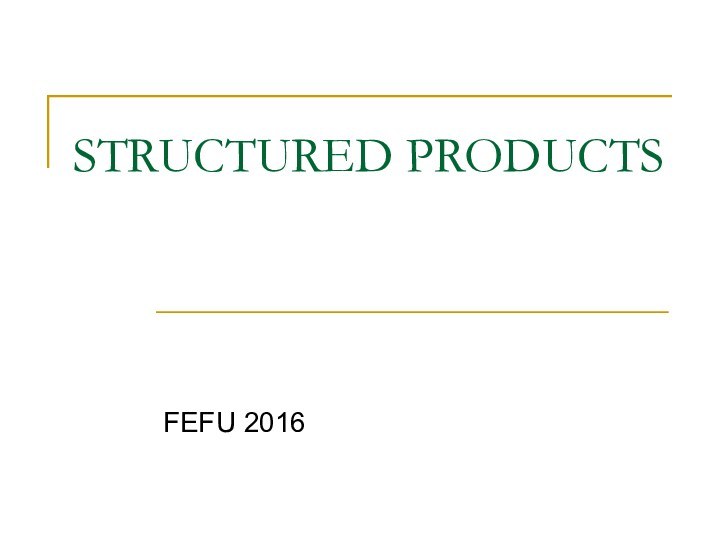
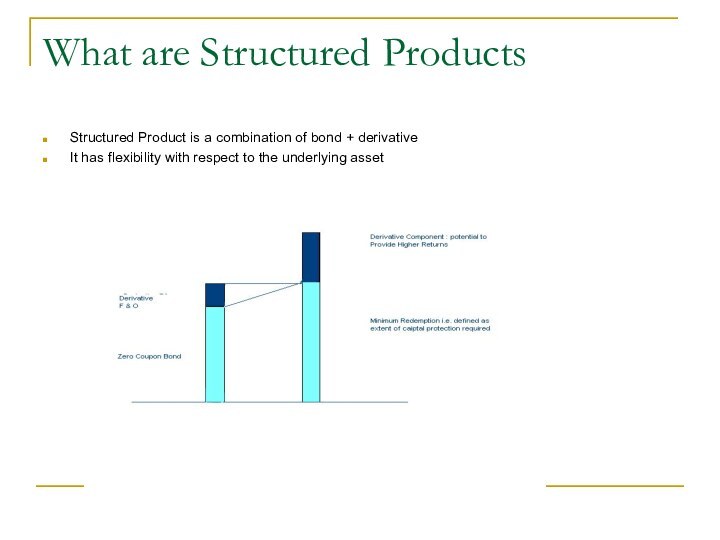
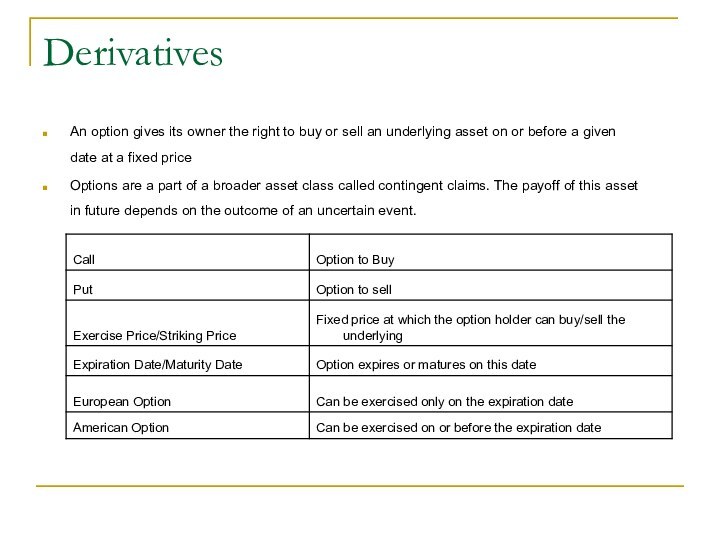
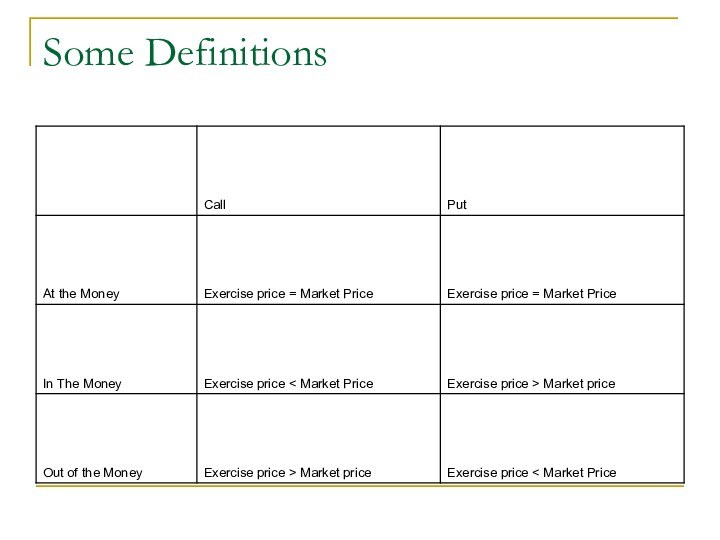
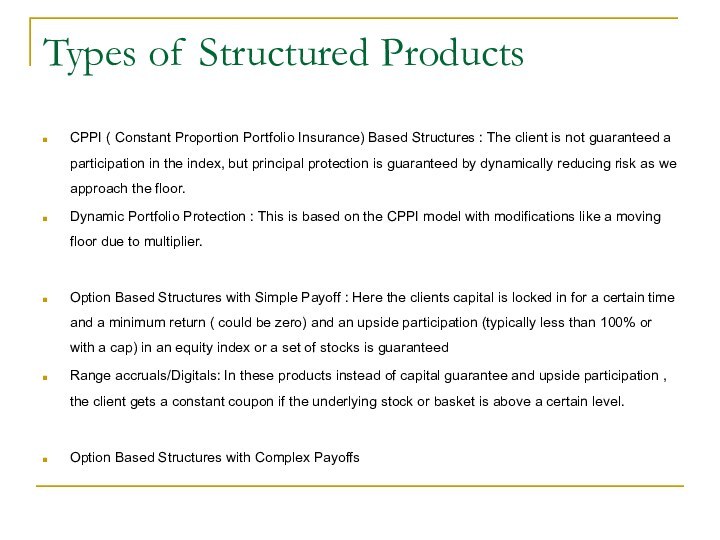
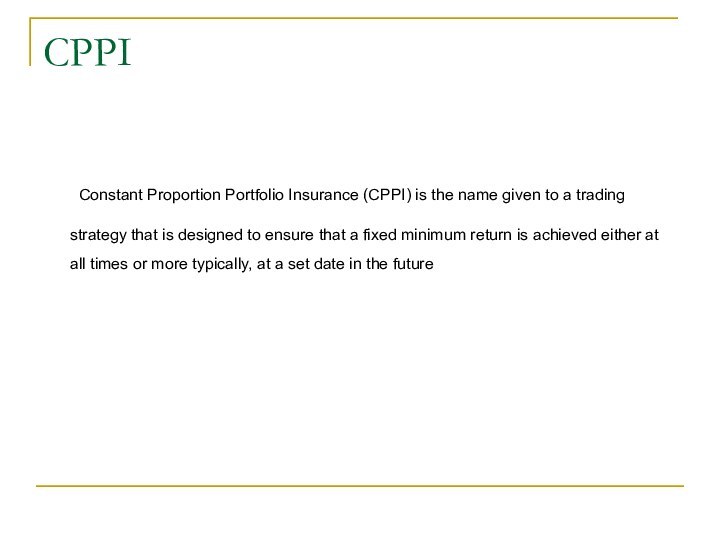
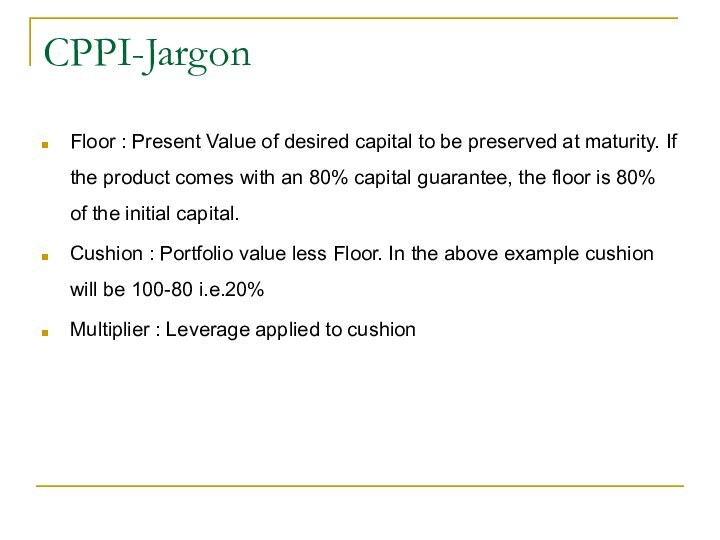
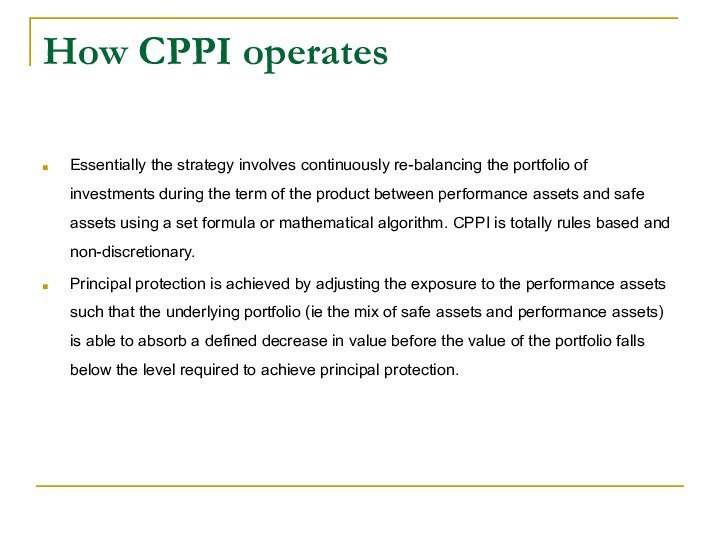
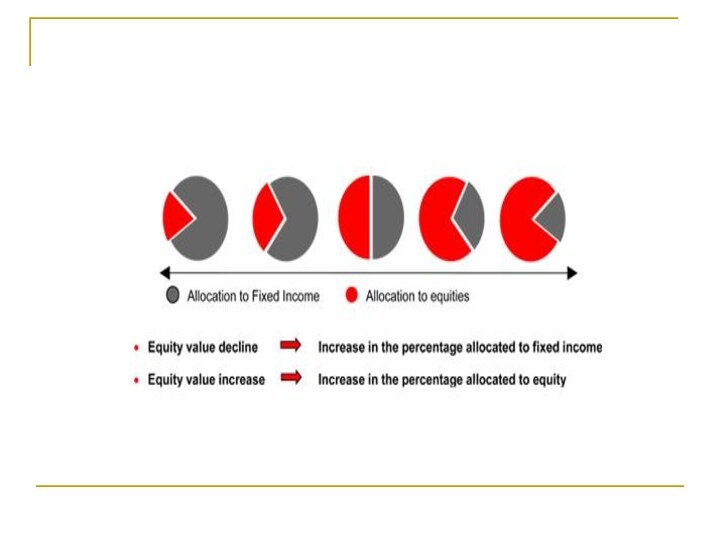
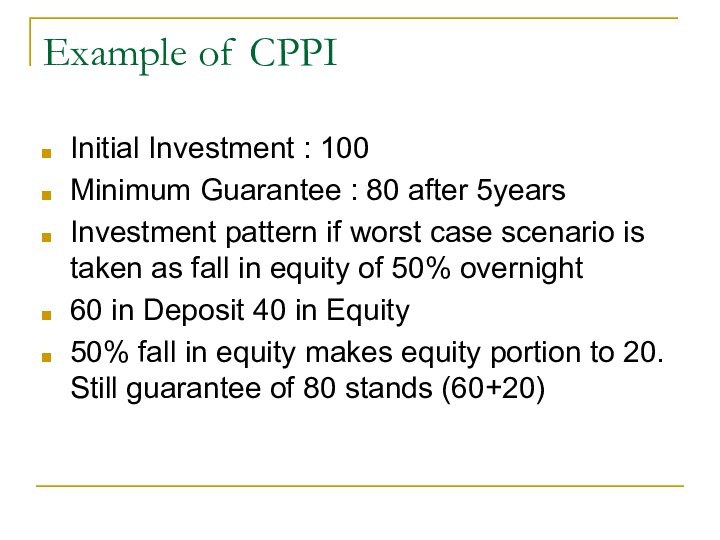
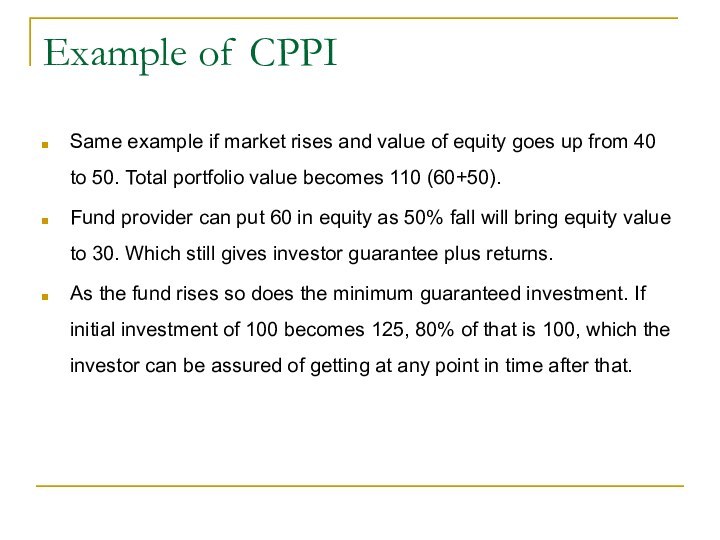
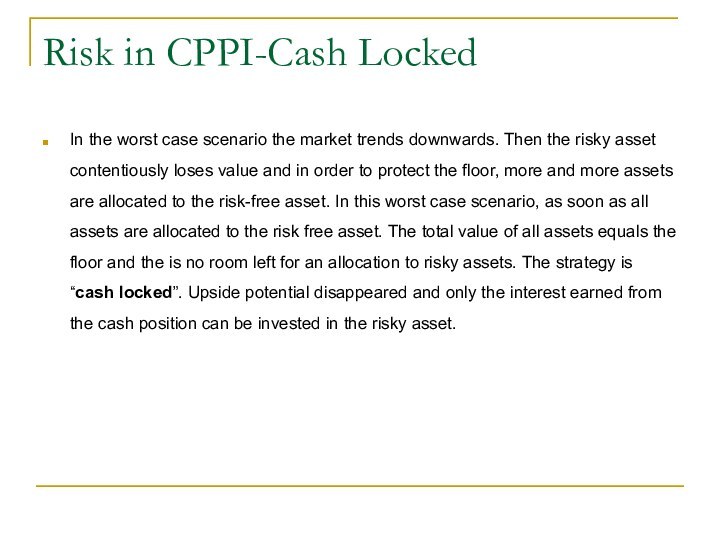
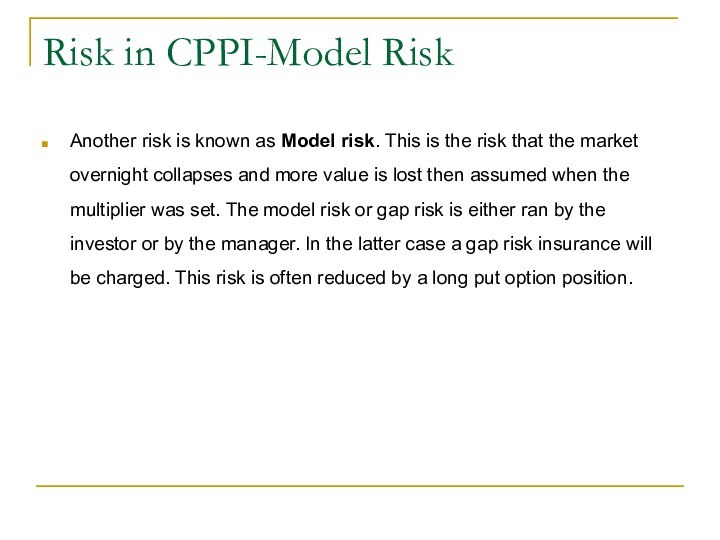

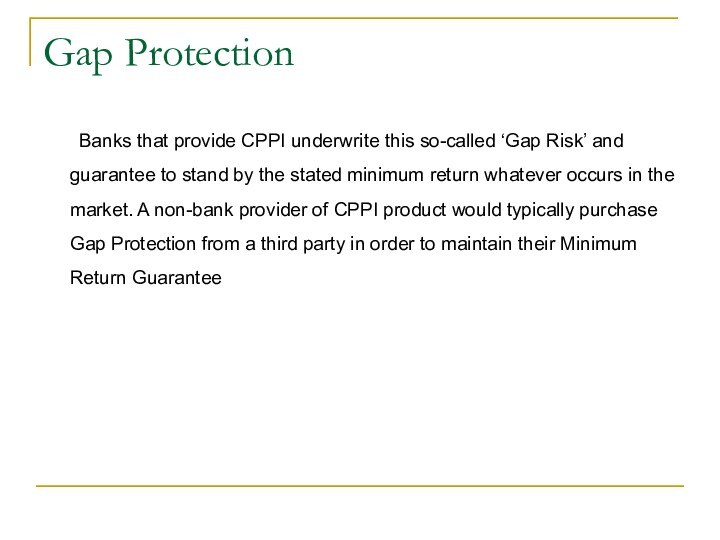
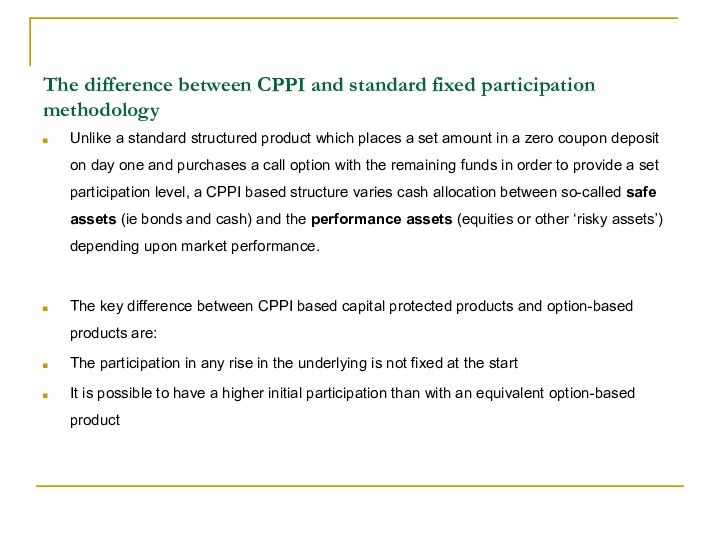
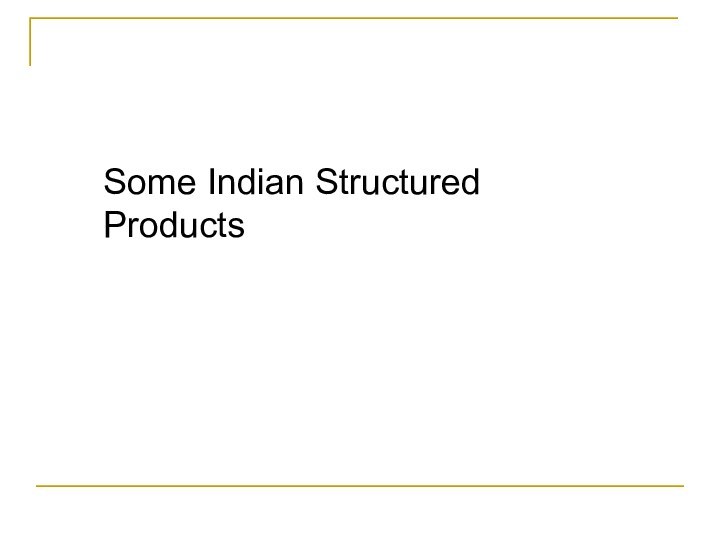
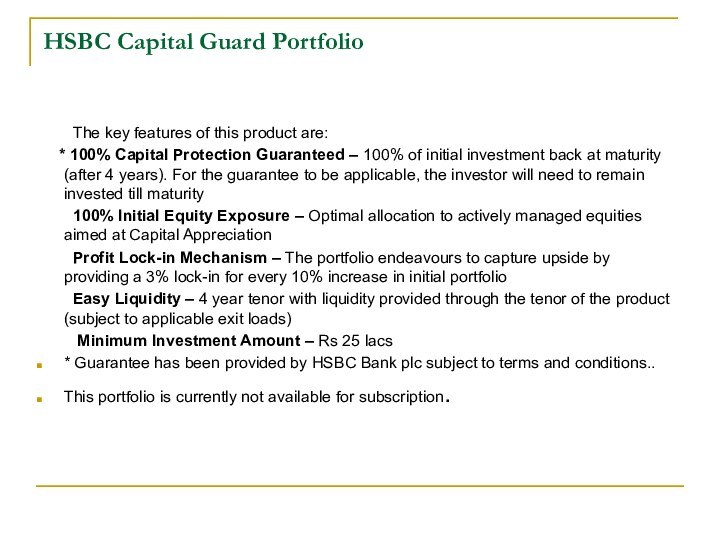
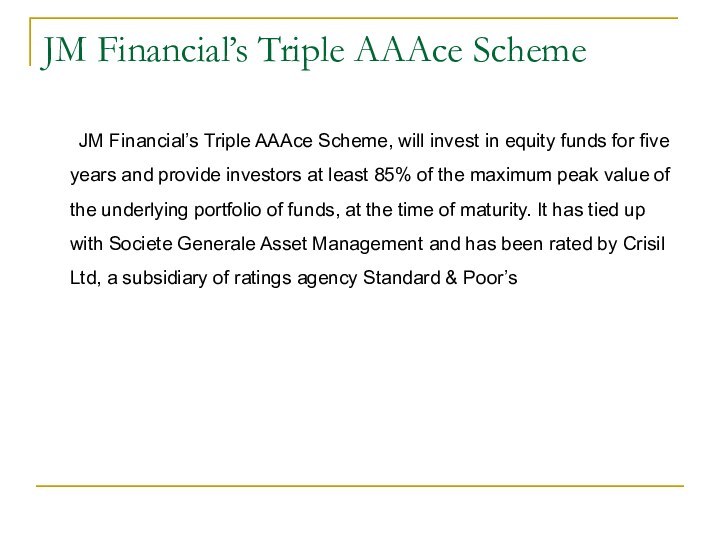
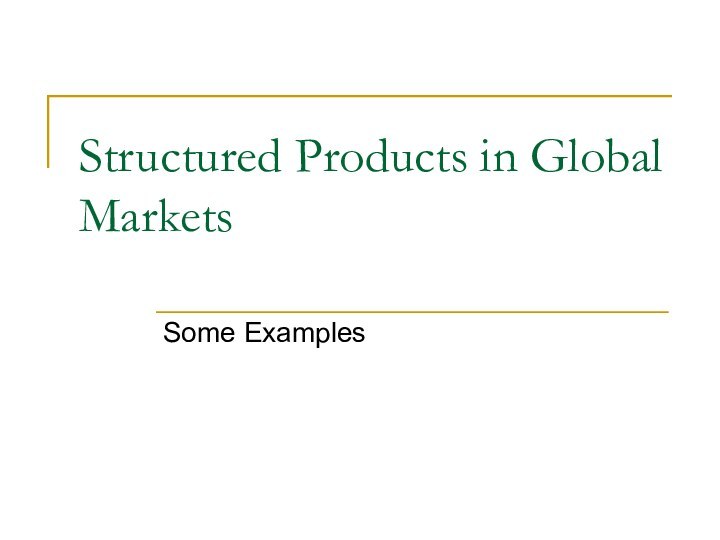
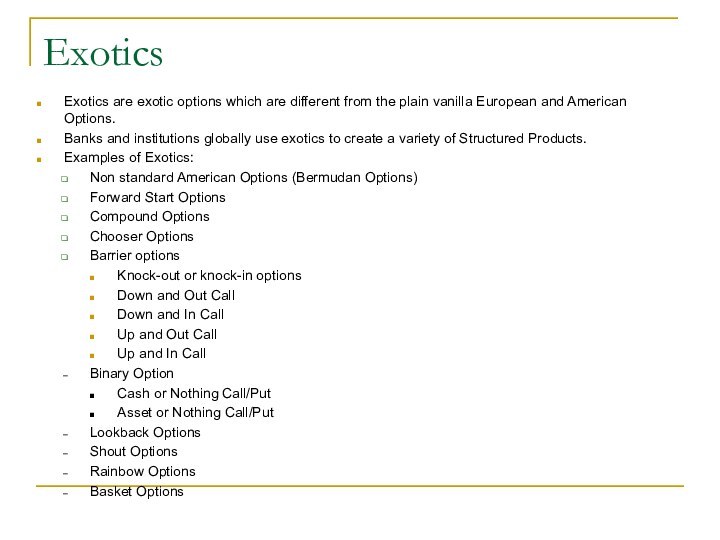
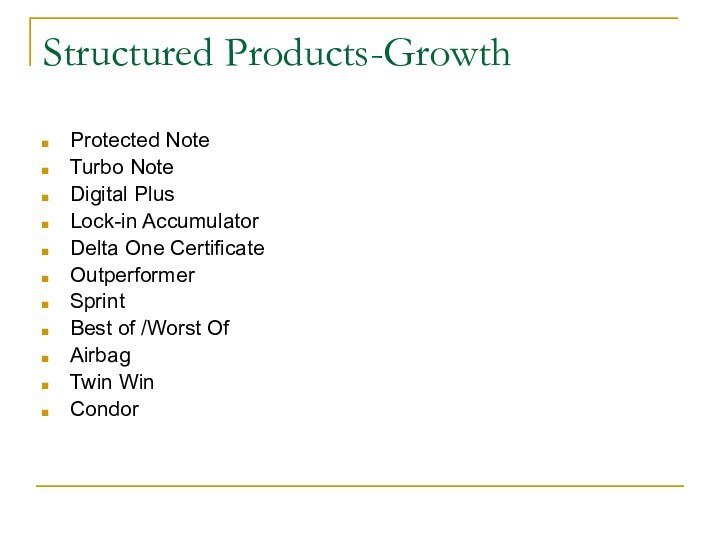
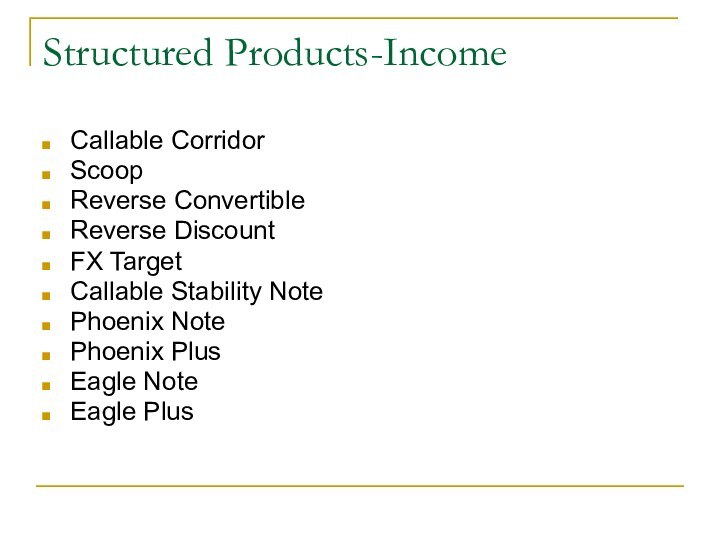
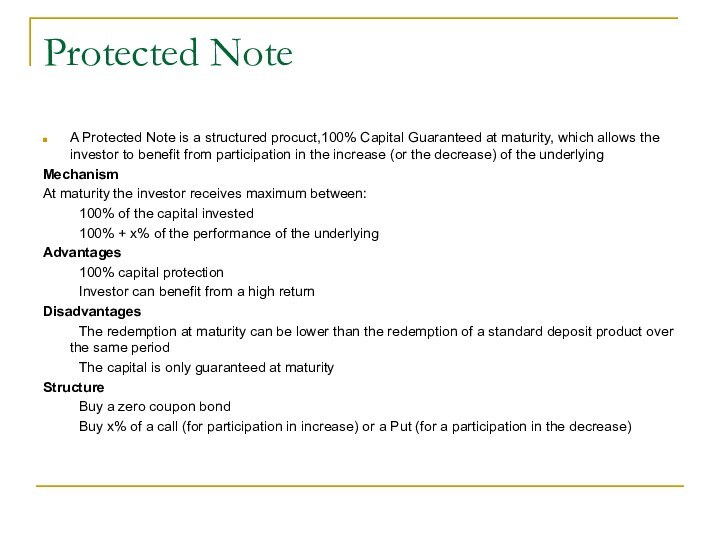
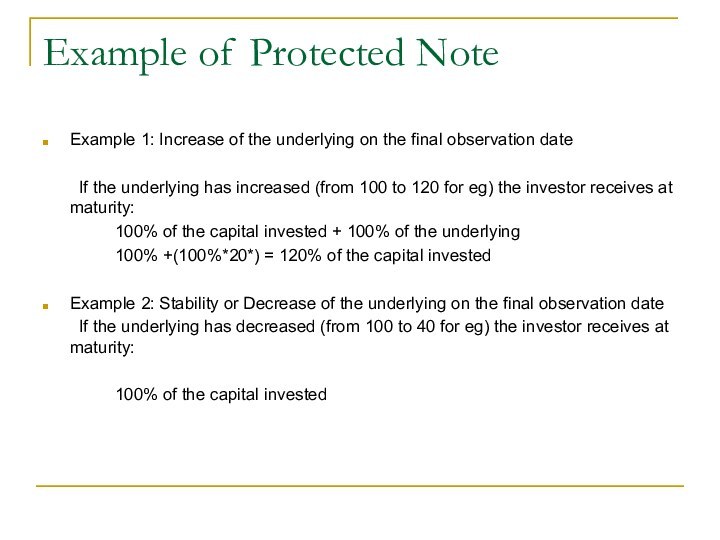
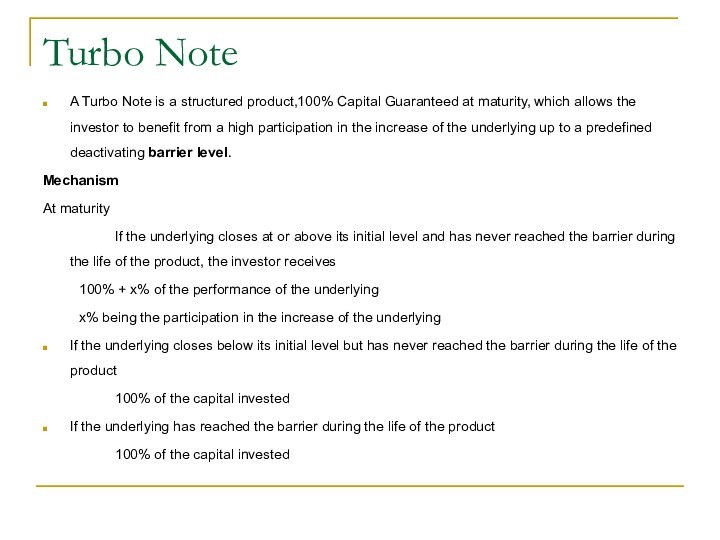
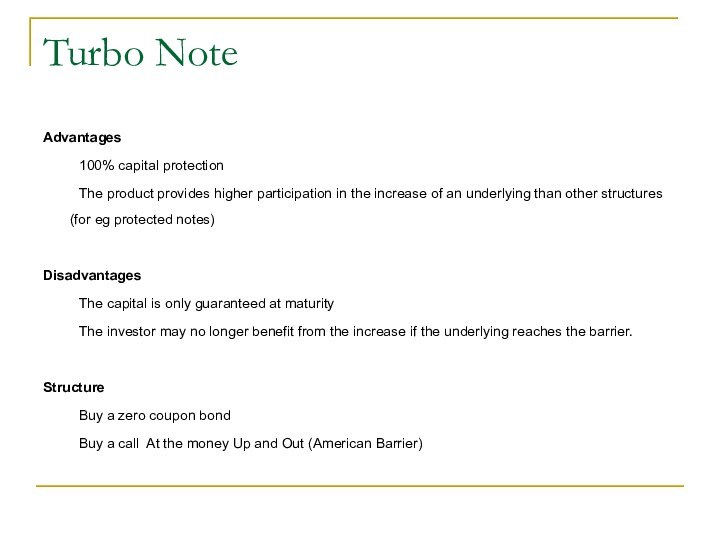
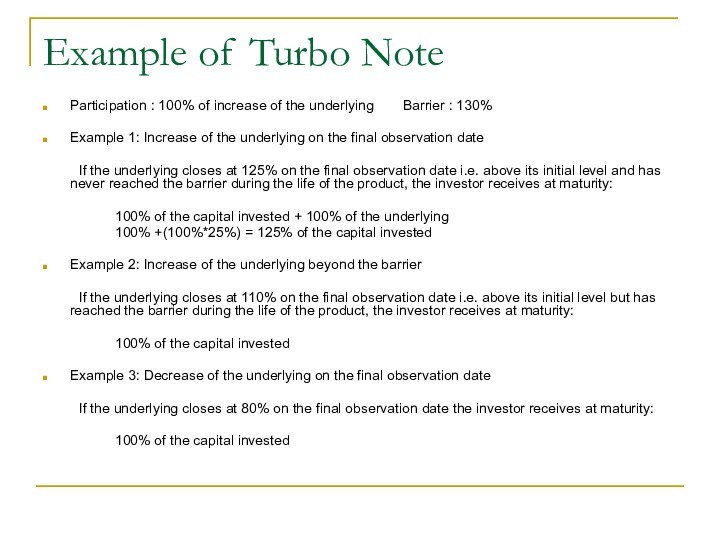
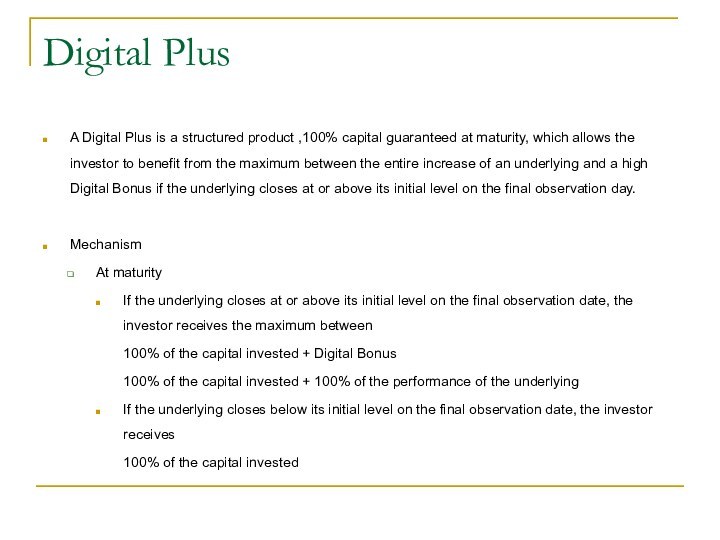
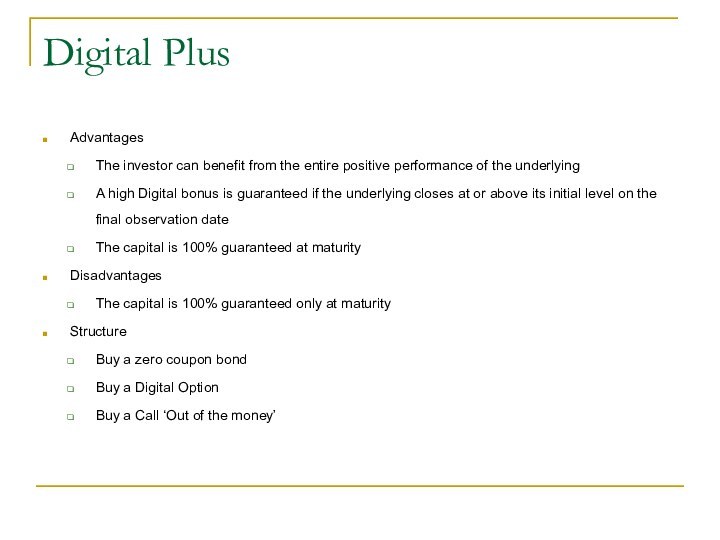
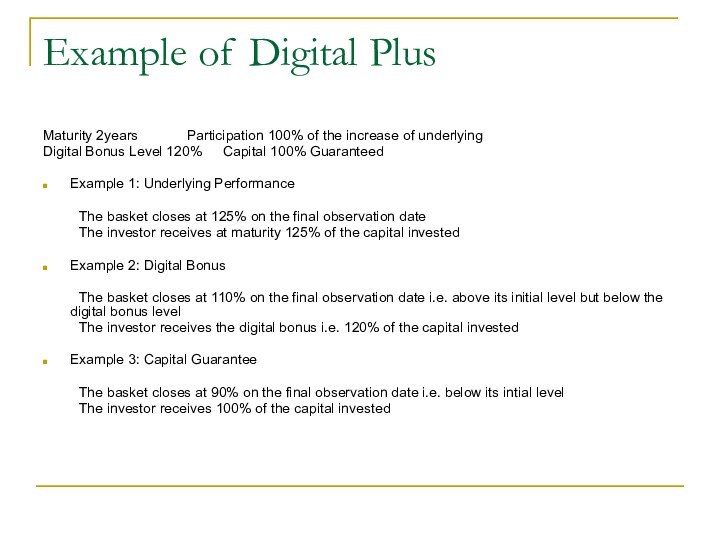
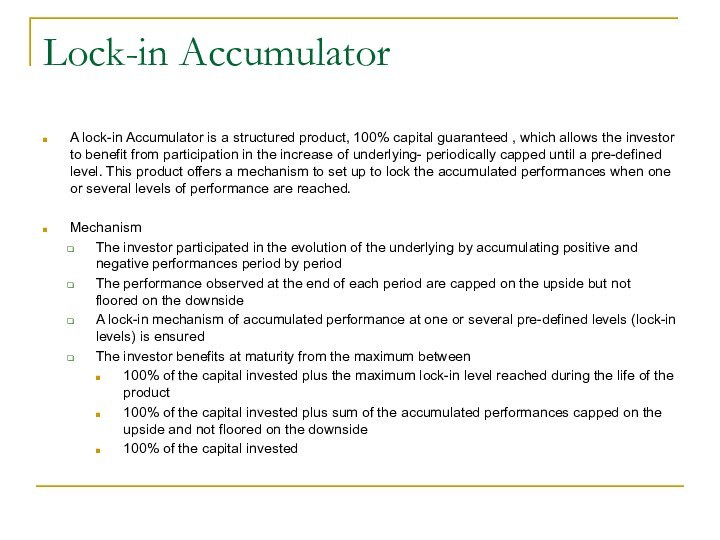
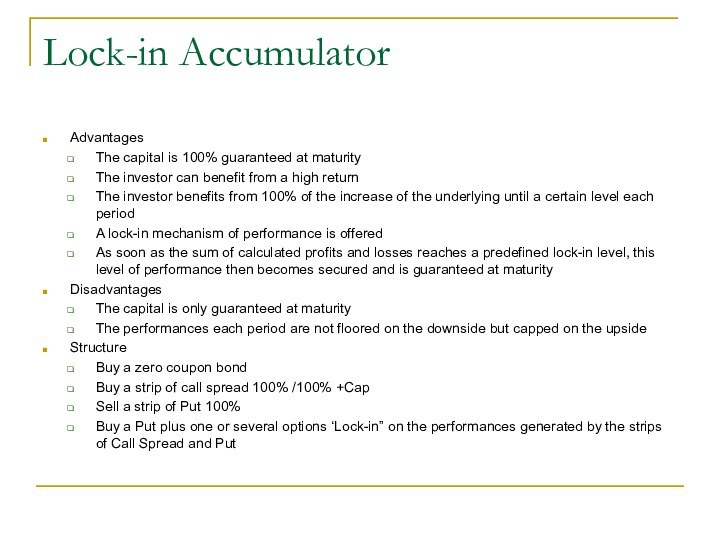
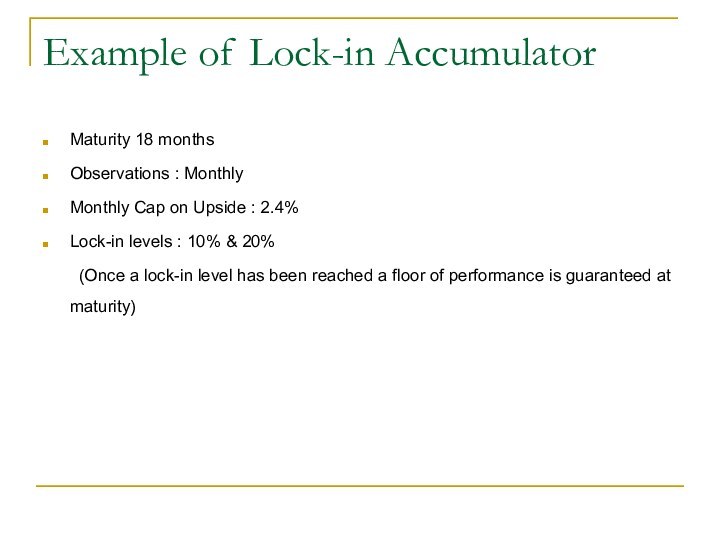
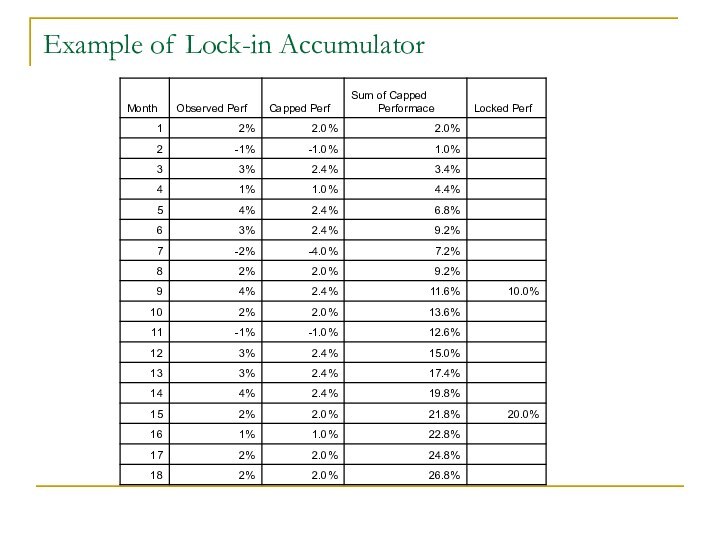
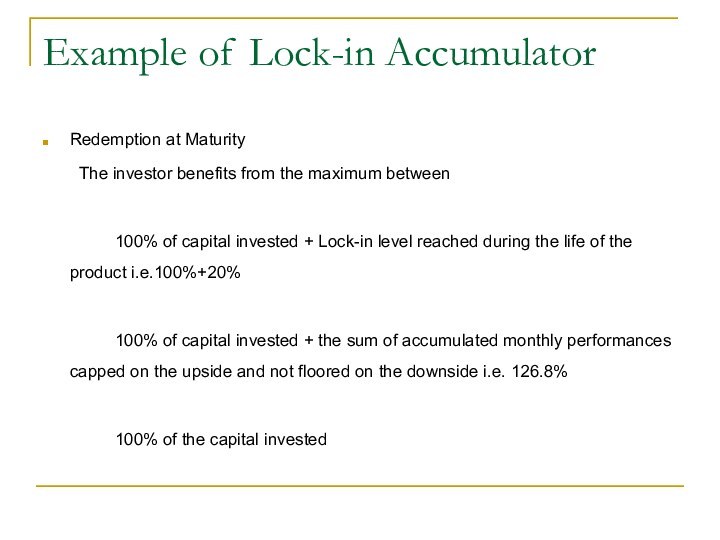
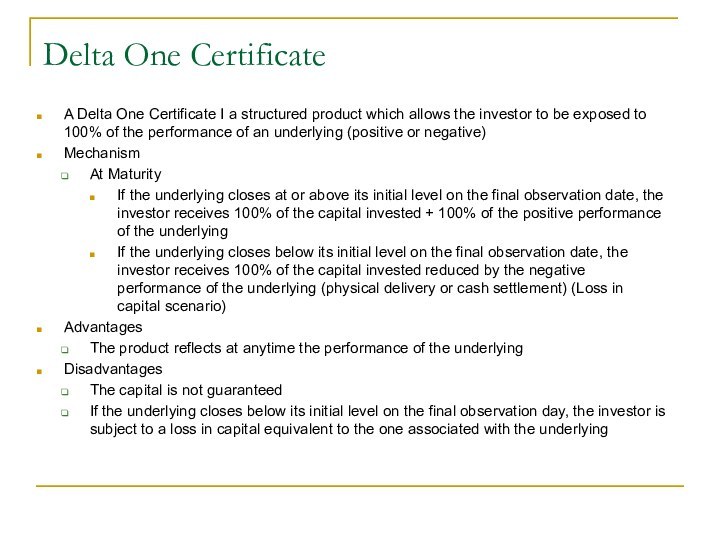
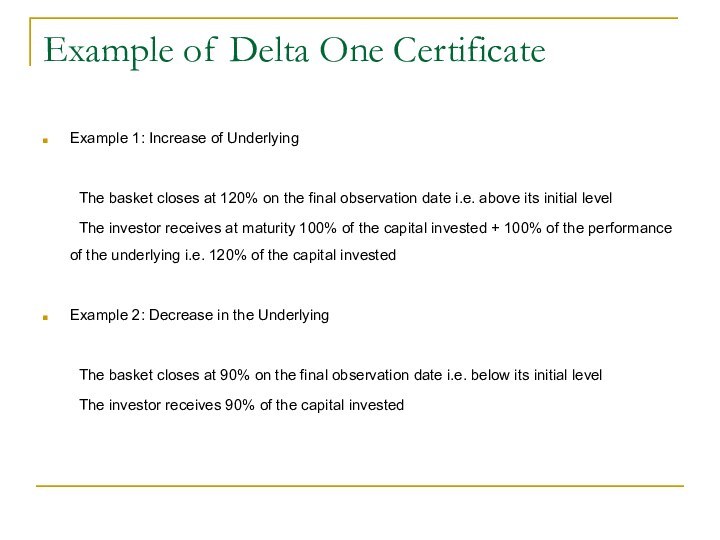
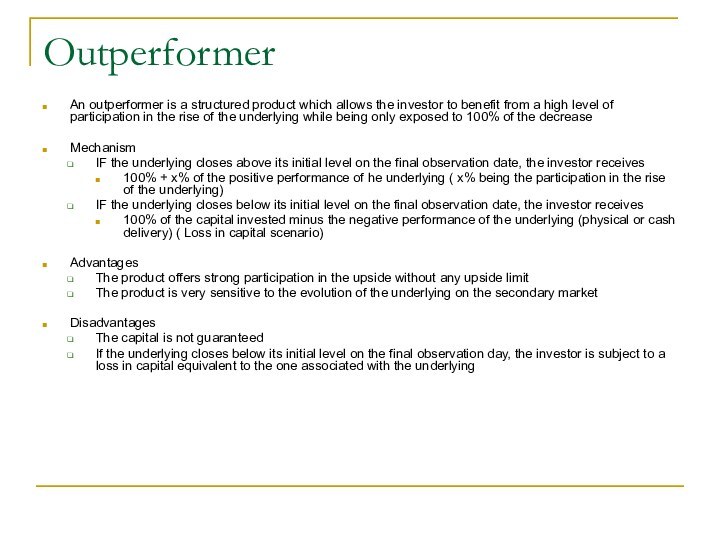
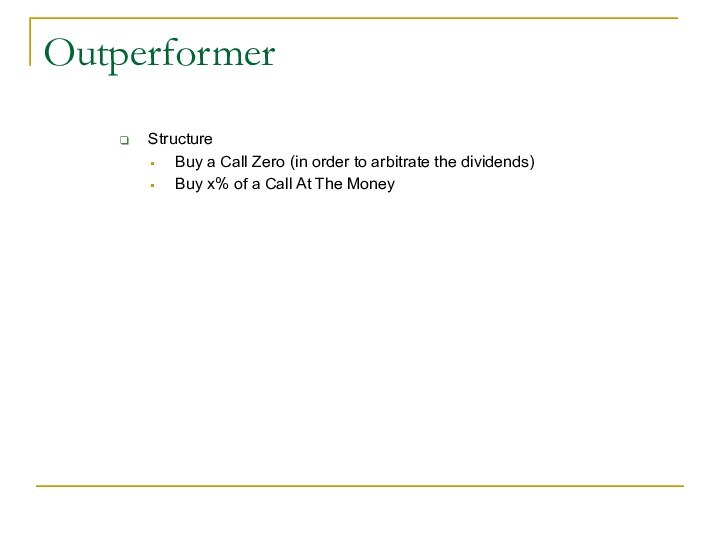
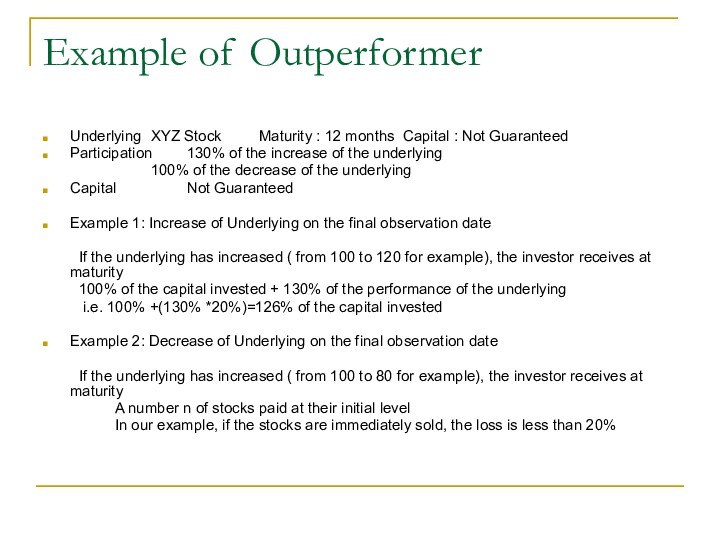
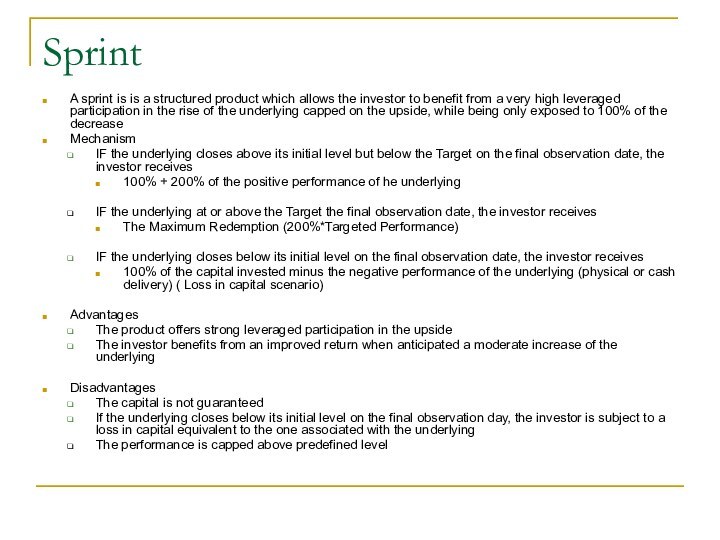
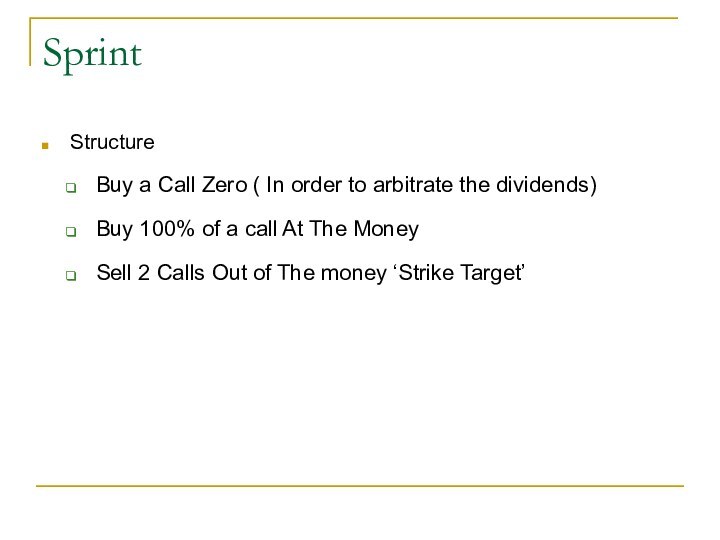
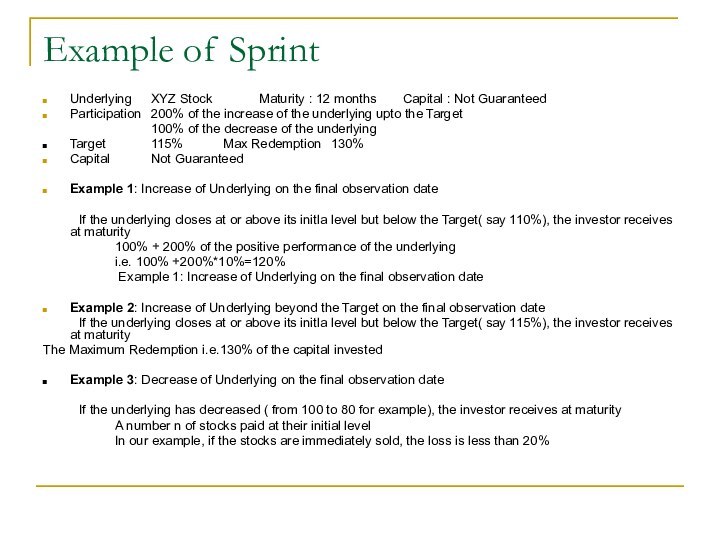
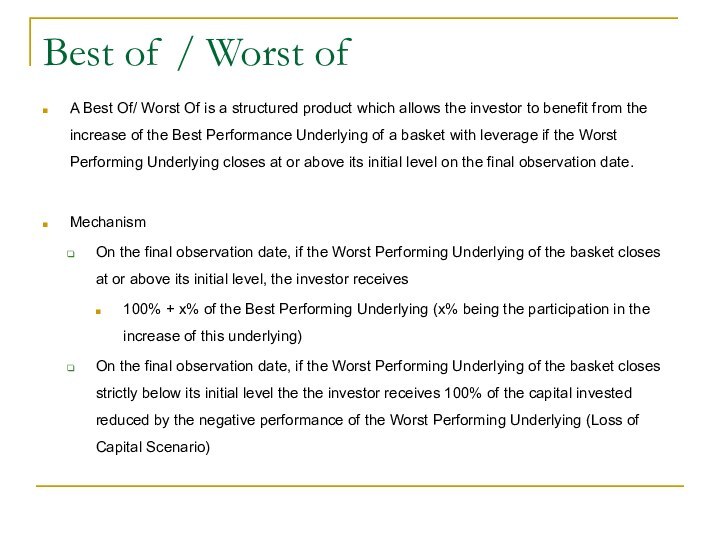
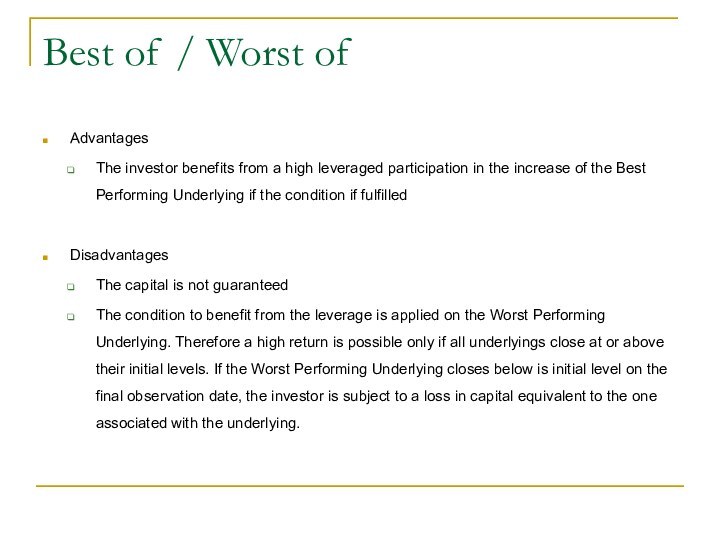
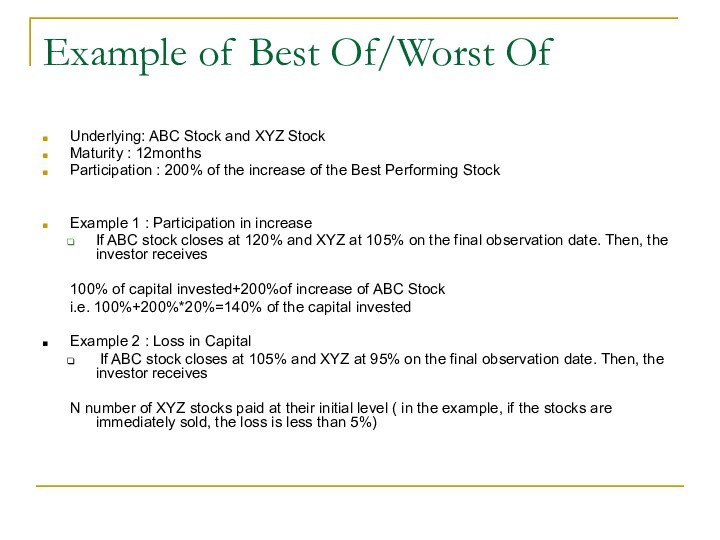
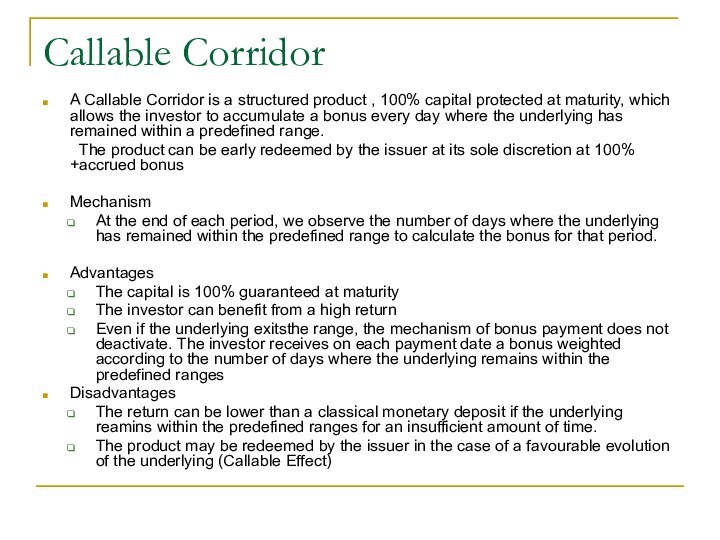
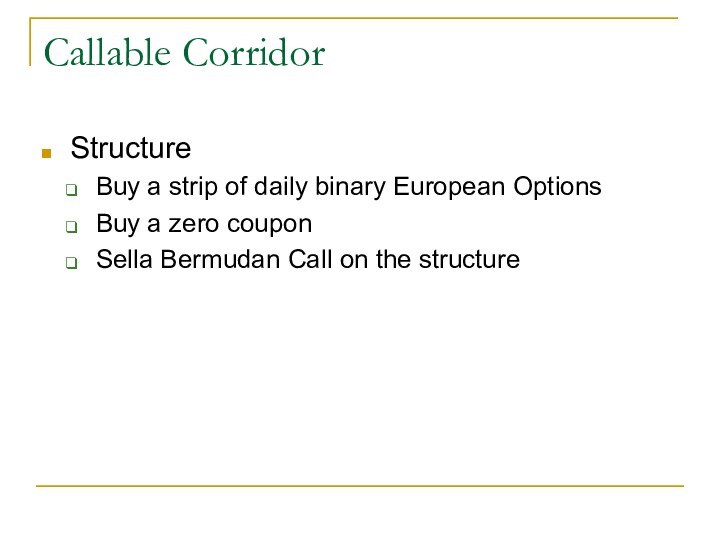
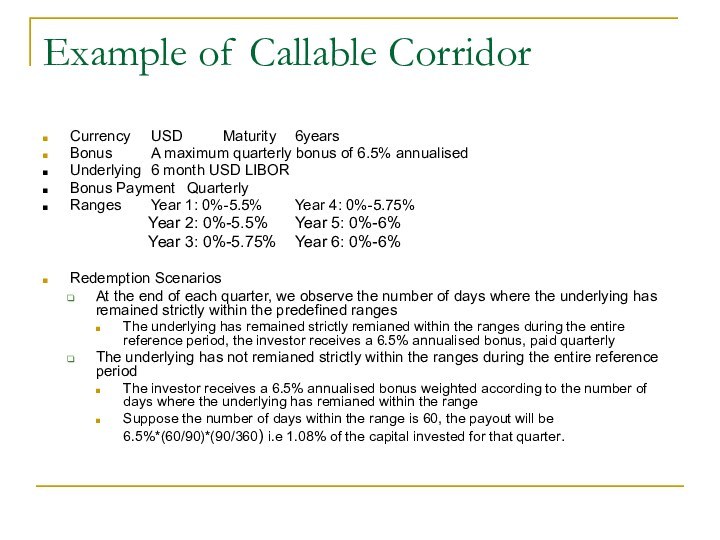
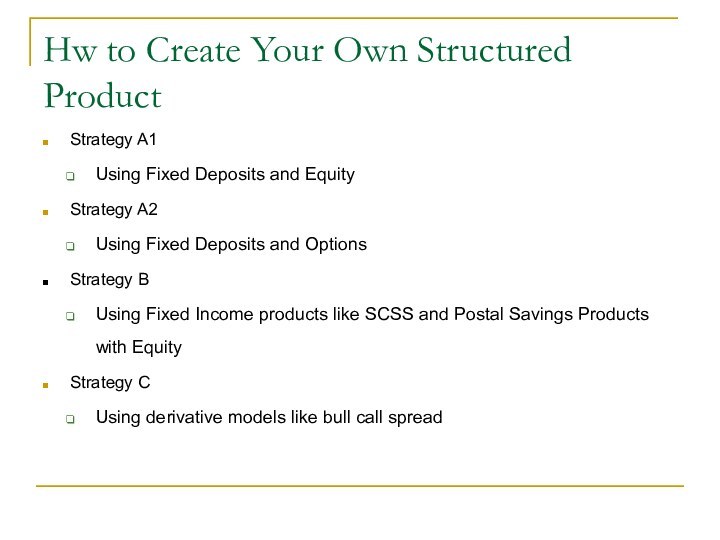
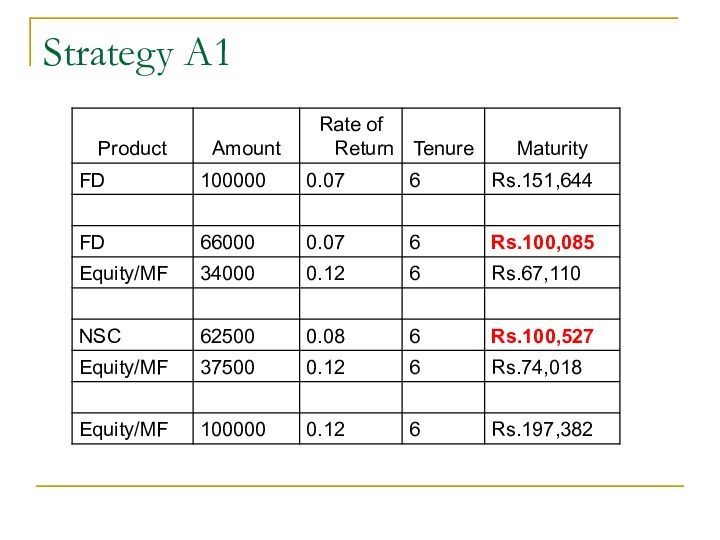
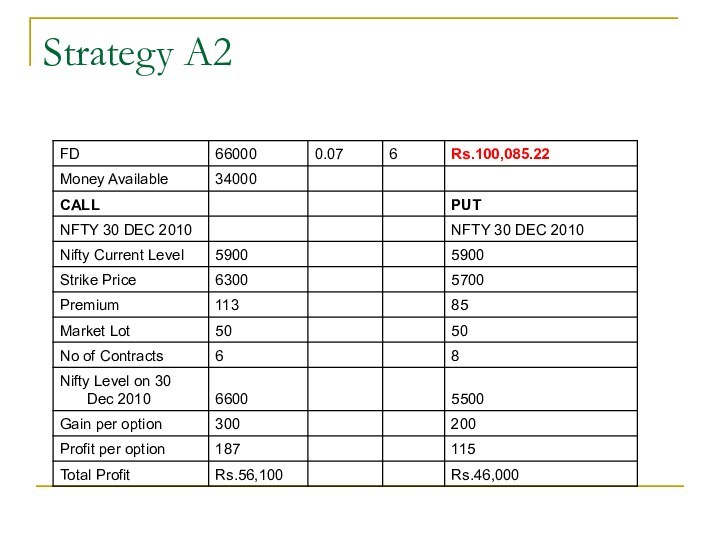
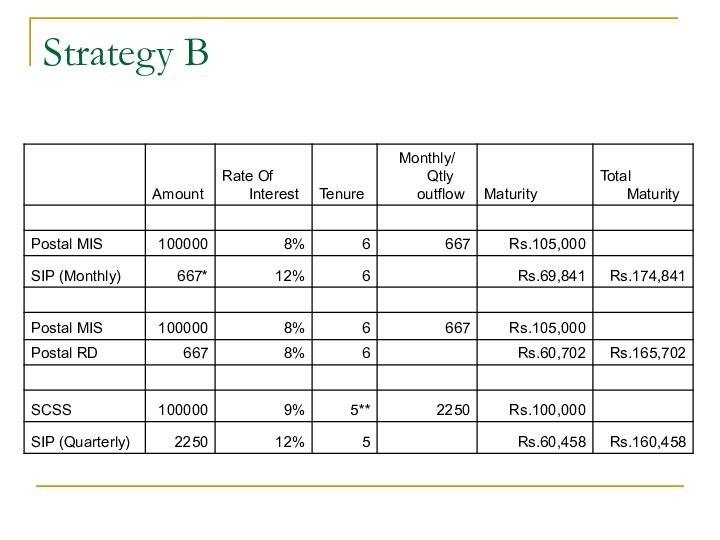
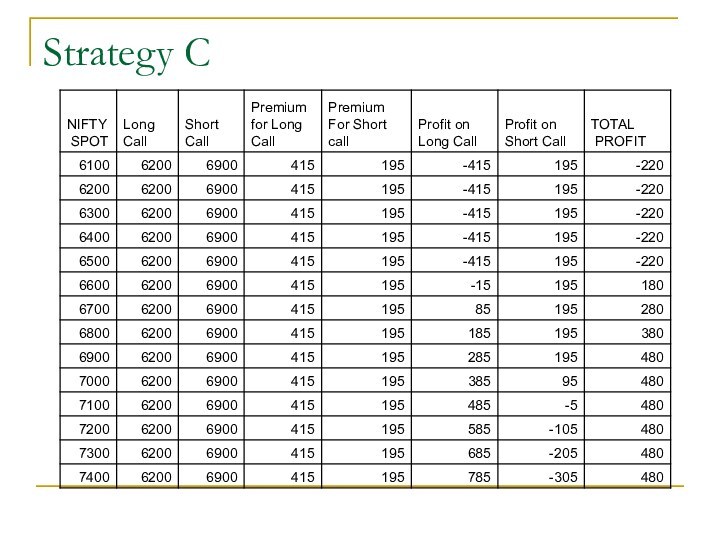
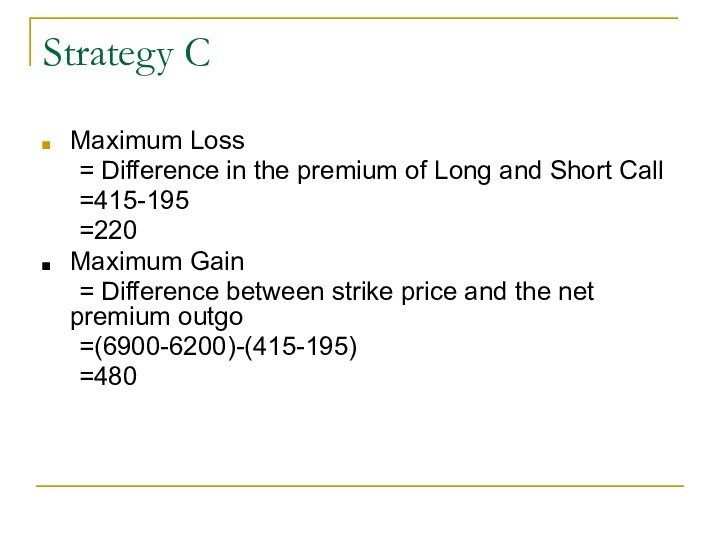
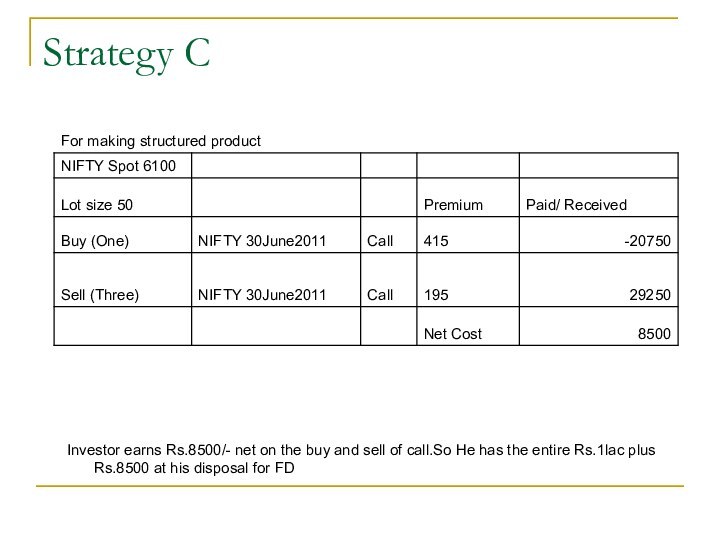
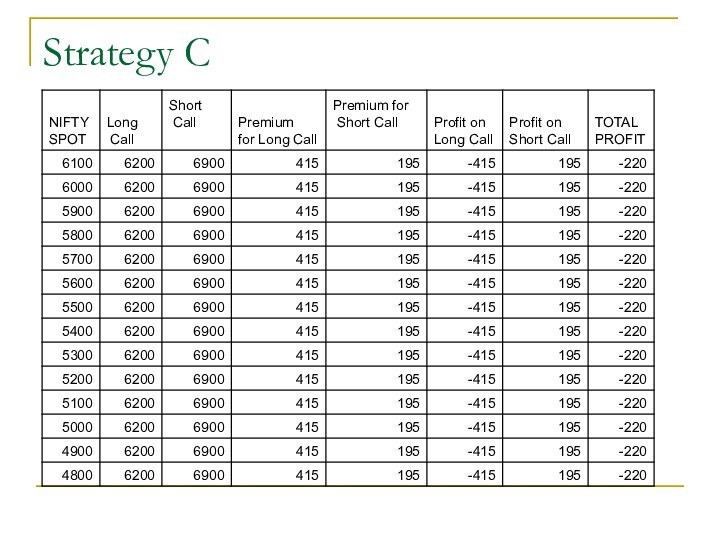
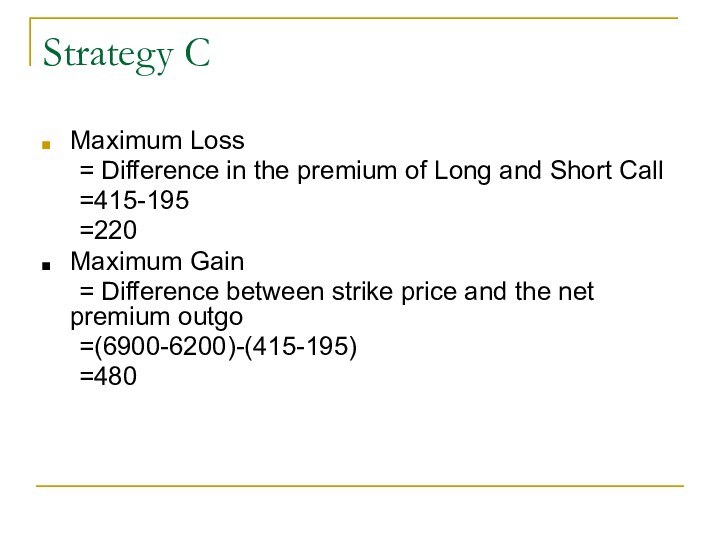
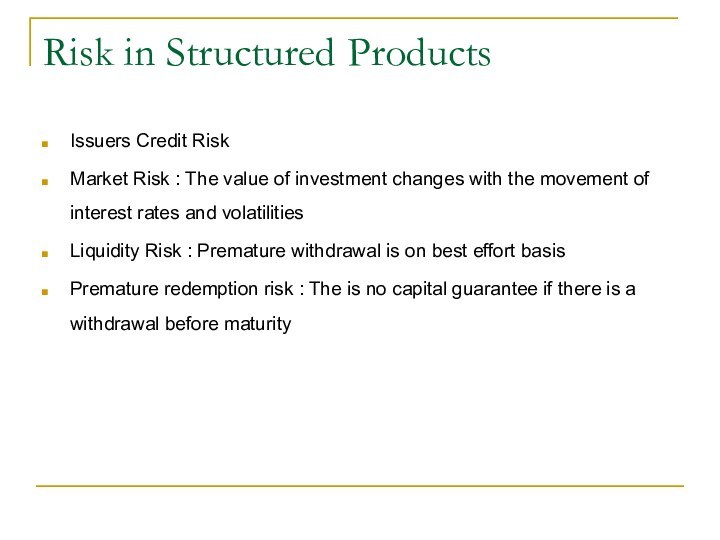
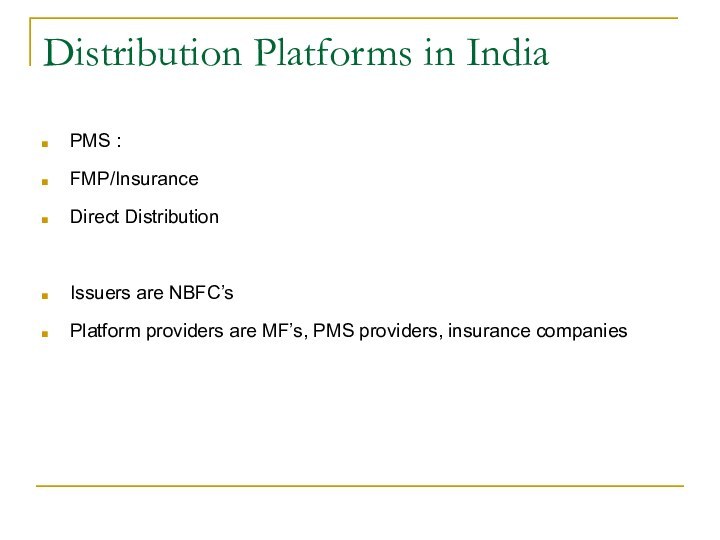
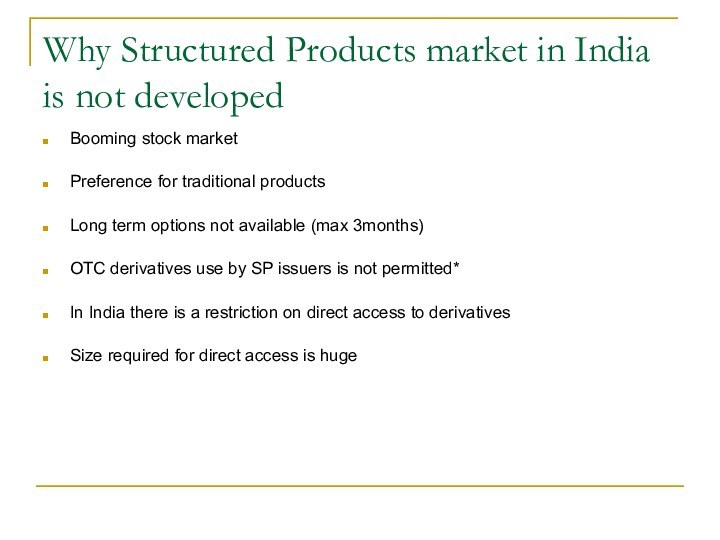
Слайд 2
What are Structured Products
Structured Product is a combination
of bond + derivative
the underlying asset
Слайд 3
Derivatives
An option gives its owner the right to
buy or sell an underlying asset on or before
a given date at a fixed priceOptions are a part of a broader asset class called contingent claims. The payoff of this asset in future depends on the outcome of an uncertain event.
Слайд 5
Types of Structured Products
CPPI ( Constant Proportion Portfolio
Insurance) Based Structures : The client is not guaranteed
a participation in the index, but principal protection is guaranteed by dynamically reducing risk as we approach the floor.Dynamic Portfolio Protection : This is based on the CPPI model with modifications like a moving floor due to multiplier.
Option Based Structures with Simple Payoff : Here the clients capital is locked in for a certain time and a minimum return ( could be zero) and an upside participation (typically less than 100% or with a cap) in an equity index or a set of stocks is guaranteed
Range accruals/Digitals: In these products instead of capital guarantee and upside participation , the client gets a constant coupon if the underlying stock or basket is above a certain level.
Option Based Structures with Complex Payoffs
Слайд 6
CPPI
Constant Proportion Portfolio Insurance (CPPI) is
the name given to a trading strategy that is
designed to ensure that a fixed minimum return is achieved either at all times or more typically, at a set date in the future
Слайд 7
CPPI-Jargon
Floor : Present Value of desired capital to
be preserved at maturity. If the product comes with
an 80% capital guarantee, the floor is 80% of the initial capital.Cushion : Portfolio value less Floor. In the above example cushion will be 100-80 i.e.20%
Multiplier : Leverage applied to cushion
Слайд 8
How CPPI operates
Essentially the strategy involves continuously re-balancing
the portfolio of investments during the term of the
product between performance assets and safe assets using a set formula or mathematical algorithm. CPPI is totally rules based and non-discretionary.Principal protection is achieved by adjusting the exposure to the performance assets such that the underlying portfolio (ie the mix of safe assets and performance assets) is able to absorb a defined decrease in value before the value of the portfolio falls below the level required to achieve principal protection.
Слайд 10
Example of CPPI
Initial Investment : 100
Minimum Guarantee :
80 after 5years
Investment pattern if worst case scenario is
taken as fall in equity of 50% overnight60 in Deposit 40 in Equity
50% fall in equity makes equity portion to 20. Still guarantee of 80 stands (60+20)
Слайд 11
Example of CPPI
Same example if market rises and
value of equity goes up from 40 to 50.
Total portfolio value becomes 110 (60+50).Fund provider can put 60 in equity as 50% fall will bring equity value to 30. Which still gives investor guarantee plus returns.
As the fund rises so does the minimum guaranteed investment. If initial investment of 100 becomes 125, 80% of that is 100, which the investor can be assured of getting at any point in time after that.
Слайд 12
Risk in CPPI-Cash Locked
In the worst case
scenario the market trends downwards. Then the risky asset
contentiously loses value and in order to protect the floor, more and more assets are allocated to the risk-free asset. In this worst case scenario, as soon as all assets are allocated to the risk free asset. The total value of all assets equals the floor and the is no room left for an allocation to risky assets. The strategy is “cash locked”. Upside potential disappeared and only the interest earned from the cash position can be invested in the risky asset.
Слайд 13
Risk in CPPI-Model Risk
Another risk is known as
Model risk. This is the risk that the market
overnight collapses and more value is lost then assumed when the multiplier was set. The model risk or gap risk is either ran by the investor or by the manager. In the latter case a gap risk insurance will be charged. This risk is often reduced by a long put option position.
Слайд 14
Risk in CPPI-Trading Band Width
According to the CPPI
methodology, risky assets are being bought in rising markets
and sold in falling markets. If then after a boost, the underlying market corrects downwards to the previous level, the same number of risky assets that were first bought at a high price now needs to be sold at a low price. A loss is recorded and a smaller allocation to the risky asset is necessary. The trading band-with should be set as wide as to prevent this, but at the same time, as small as to reduce the gap risk. Next to the multiplier the trading band-width is a key to a successful CPPI product.
Слайд 15
Gap Protection
Banks that provide CPPI underwrite this so-called
‘Gap Risk’ and guarantee to stand by the stated
minimum return whatever occurs in the market. A non-bank provider of CPPI product would typically purchase Gap Protection from a third party in order to maintain their Minimum Return GuaranteeСлайд 16 The difference between CPPI and standard fixed participation
methodology
Unlike a standard structured product which places a set
amount in a zero coupon deposit on day one and purchases a call option with the remaining funds in order to provide a set participation level, a CPPI based structure varies cash allocation between so-called safe assets (ie bonds and cash) and the performance assets (equities or other ‘risky assets’) depending upon market performance.The key difference between CPPI based capital protected products and option-based products are:
The participation in any rise in the underlying is not fixed at the start
It is possible to have a higher initial participation than with an equivalent option-based product
Слайд 18
HSBC Capital Guard Portfolio
The key features of this
product are:
* 100% Capital Protection Guaranteed – 100%
of initial investment back at maturity (after 4 years). For the guarantee to be applicable, the investor will need to remain invested till maturity 100% Initial Equity Exposure – Optimal allocation to actively managed equities aimed at Capital Appreciation
Profit Lock-in Mechanism – The portfolio endeavours to capture upside by providing a 3% lock-in for every 10% increase in initial portfolio
Easy Liquidity – 4 year tenor with liquidity provided through the tenor of the product (subject to applicable exit loads)
Minimum Investment Amount – Rs 25 lacs
* Guarantee has been provided by HSBC Bank plc subject to terms and conditions..
This portfolio is currently not available for subscription.
Слайд 19
JM Financial’s Triple AAAce Scheme
JM Financial’s Triple AAAce
Scheme, will invest in equity funds for five years
and provide investors at least 85% of the maximum peak value of the underlying portfolio of funds, at the time of maturity. It has tied up with Societe Generale Asset Management and has been rated by Crisil Ltd, a subsidiary of ratings agency Standard & Poor’s
Слайд 21
Exotics
Exotics are exotic options which are different from
the plain vanilla European and American Options.
Banks and
institutions globally use exotics to create a variety of Structured Products.Examples of Exotics:
Non standard American Options (Bermudan Options)
Forward Start Options
Compound Options
Chooser Options
Barrier options
Knock-out or knock-in options
Down and Out Call
Down and In Call
Up and Out Call
Up and In Call
Binary Option
Cash or Nothing Call/Put
Asset or Nothing Call/Put
Lookback Options
Shout Options
Rainbow Options
Basket Options
Слайд 22
Structured Products-Growth
Protected Note
Turbo Note
Digital Plus
Lock-in Accumulator
Delta One Certificate
Outperformer
Sprint
Best
of /Worst Of
Airbag
Twin Win
Condor
Слайд 23
Structured Products-Income
Callable Corridor
Scoop
Reverse Convertible
Reverse Discount
FX Target
Callable Stability Note
Phoenix
Note
Phoenix Plus
Eagle Note
Eagle Plus
Слайд 24
Protected Note
A Protected Note is a structured procuct,100%
Capital Guaranteed at maturity, which allows the investor to
benefit from participation in the increase (or the decrease) of the underlyingMechanism
At maturity the investor receives maximum between:
100% of the capital invested
100% + x% of the performance of the underlying
Advantages
100% capital protection
Investor can benefit from a high return
Disadvantages
The redemption at maturity can be lower than the redemption of a standard deposit product over the same period
The capital is only guaranteed at maturity
Structure
Buy a zero coupon bond
Buy x% of a call (for participation in increase) or a Put (for a participation in the decrease)
Слайд 25
Example of Protected Note
Example 1: Increase of the
underlying on the final observation date
If the underlying has
increased (from 100 to 120 for eg) the investor receives at maturity:100% of the capital invested + 100% of the underlying
100% +(100%*20*) = 120% of the capital invested
Example 2: Stability or Decrease of the underlying on the final observation date
If the underlying has decreased (from 100 to 40 for eg) the investor receives at maturity:
100% of the capital invested
Слайд 26
Turbo Note
A Turbo Note is a structured product,100%
Capital Guaranteed at maturity, which allows the investor to
benefit from a high participation in the increase of the underlying up to a predefined deactivating barrier level.Mechanism
At maturity
If the underlying closes at or above its initial level and has never reached the barrier during the life of the product, the investor receives
100% + x% of the performance of the underlying
x% being the participation in the increase of the underlying
If the underlying closes below its initial level but has never reached the barrier during the life of the product
100% of the capital invested
If the underlying has reached the barrier during the life of the product
100% of the capital invested
Слайд 27
Turbo Note
Advantages
100% capital protection
The product provides higher participation
in the increase of an underlying than other structures
(for eg protected notes)Disadvantages
The capital is only guaranteed at maturity
The investor may no longer benefit from the increase if the underlying reaches the barrier.
Structure
Buy a zero coupon bond
Buy a call At the money Up and Out (American Barrier)
Слайд 28
Example of Turbo Note
Participation : 100% of increase
of the underlying Barrier : 130%
Example 1: Increase of
the underlying on the final observation dateIf the underlying closes at 125% on the final observation date i.e. above its initial level and has never reached the barrier during the life of the product, the investor receives at maturity:
100% of the capital invested + 100% of the underlying
100% +(100%*25%) = 125% of the capital invested
Example 2: Increase of the underlying beyond the barrier
If the underlying closes at 110% on the final observation date i.e. above its initial level but has reached the barrier during the life of the product, the investor receives at maturity:
100% of the capital invested
Example 3: Decrease of the underlying on the final observation date
If the underlying closes at 80% on the final observation date the investor receives at maturity:
100% of the capital invested
Слайд 29
Digital Plus
A Digital Plus is a structured product
,100% capital guaranteed at maturity, which allows the investor
to benefit from the maximum between the entire increase of an underlying and a high Digital Bonus if the underlying closes at or above its initial level on the final observation day.Mechanism
At maturity
If the underlying closes at or above its initial level on the final observation date, the investor receives the maximum between
100% of the capital invested + Digital Bonus
100% of the capital invested + 100% of the performance of the underlying
If the underlying closes below its initial level on the final observation date, the investor receives
100% of the capital invested
Слайд 30
Digital Plus
Advantages
The investor can benefit from the entire
positive performance of the underlying
A high Digital bonus is
guaranteed if the underlying closes at or above its initial level on the final observation dateThe capital is 100% guaranteed at maturity
Disadvantages
The capital is 100% guaranteed only at maturity
Structure
Buy a zero coupon bond
Buy a Digital Option
Buy a Call ‘Out of the money’
Слайд 31
Example of Digital Plus
Maturity 2years Participation 100% of the
increase of underlying
Digital Bonus Level 120% Capital 100% Guaranteed
Example 1:
Underlying PerformanceThe basket closes at 125% on the final observation date
The investor receives at maturity 125% of the capital invested
Example 2: Digital Bonus
The basket closes at 110% on the final observation date i.e. above its initial level but below the digital bonus level
The investor receives the digital bonus i.e. 120% of the capital invested
Example 3: Capital Guarantee
The basket closes at 90% on the final observation date i.e. below its intial level
The investor receives 100% of the capital invested
Слайд 32
Lock-in Accumulator
A lock-in Accumulator is a structured product,
100% capital guaranteed , which allows the investor to
benefit from participation in the increase of underlying- periodically capped until a pre-defined level. This product offers a mechanism to set up to lock the accumulated performances when one or several levels of performance are reached.Mechanism
The investor participated in the evolution of the underlying by accumulating positive and negative performances period by period
The performance observed at the end of each period are capped on the upside but not floored on the downside
A lock-in mechanism of accumulated performance at one or several pre-defined levels (lock-in levels) is ensured
The investor benefits at maturity from the maximum between
100% of the capital invested plus the maximum lock-in level reached during the life of the product
100% of the capital invested plus sum of the accumulated performances capped on the upside and not floored on the downside
100% of the capital invested
Слайд 33
Lock-in Accumulator
Advantages
The capital is 100% guaranteed at maturity
The
investor can benefit from a high return
The investor benefits
from 100% of the increase of the underlying until a certain level each periodA lock-in mechanism of performance is offered
As soon as the sum of calculated profits and losses reaches a predefined lock-in level, this level of performance then becomes secured and is guaranteed at maturity
Disadvantages
The capital is only guaranteed at maturity
The performances each period are not floored on the downside but capped on the upside
Structure
Buy a zero coupon bond
Buy a strip of call spread 100% /100% +Cap
Sell a strip of Put 100%
Buy a Put plus one or several options ‘Lock-in” on the performances generated by the strips of Call Spread and Put
Слайд 34
Example of Lock-in Accumulator
Maturity 18 months
Observations : Monthly
Monthly
Cap on Upside : 2.4%
Lock-in levels : 10% &
20%(Once a lock-in level has been reached a floor of performance is guaranteed at maturity)
Слайд 36
Example of Lock-in Accumulator
Redemption at Maturity
The investor benefits
from the maximum between
100% of capital invested + Lock-in
level reached during the life of the product i.e.100%+20%100% of capital invested + the sum of accumulated monthly performances capped on the upside and not floored on the downside i.e. 126.8%
100% of the capital invested
Слайд 37
Delta One Certificate
A Delta One Certificate I a
structured product which allows the investor to be exposed
to 100% of the performance of an underlying (positive or negative)Mechanism
At Maturity
If the underlying closes at or above its initial level on the final observation date, the investor receives 100% of the capital invested + 100% of the positive performance of the underlying
If the underlying closes below its initial level on the final observation date, the investor receives 100% of the capital invested reduced by the negative performance of the underlying (physical delivery or cash settlement) (Loss in capital scenario)
Advantages
The product reflects at anytime the performance of the underlying
Disadvantages
The capital is not guaranteed
If the underlying closes below its initial level on the final observation day, the investor is subject to a loss in capital equivalent to the one associated with the underlying
Слайд 38
Example of Delta One Certificate
Example 1: Increase of
Underlying
The basket closes at 120% on the final observation
date i.e. above its initial levelThe investor receives at maturity 100% of the capital invested + 100% of the performance of the underlying i.e. 120% of the capital invested
Example 2: Decrease in the Underlying
The basket closes at 90% on the final observation date i.e. below its initial level
The investor receives 90% of the capital invested
Слайд 39
Outperformer
An outperformer is a structured product which allows
the investor to benefit from a high level of
participation in the rise of the underlying while being only exposed to 100% of the decreaseMechanism
IF the underlying closes above its initial level on the final observation date, the investor receives
100% + x% of the positive performance of he underlying ( x% being the participation in the rise of the underlying)
IF the underlying closes below its initial level on the final observation date, the investor receives
100% of the capital invested minus the negative performance of the underlying (physical or cash delivery) ( Loss in capital scenario)
Advantages
The product offers strong participation in the upside without any upside limit
The product is very sensitive to the evolution of the underlying on the secondary market
Disadvantages
The capital is not guaranteed
If the underlying closes below its initial level on the final observation day, the investor is subject to a loss in capital equivalent to the one associated with the underlying
Слайд 40
Outperformer
Structure
Buy a Call Zero (in order to arbitrate
the dividends)
Buy x% of a Call At The Money
Слайд 41
Example of Outperformer
Underlying XYZ Stock Maturity : 12 months Capital :
Not Guaranteed
Participation 130% of the increase of the underlying
100% of
the decrease of the underlyingCapital Not Guaranteed
Example 1: Increase of Underlying on the final observation date
If the underlying has increased ( from 100 to 120 for example), the investor receives at maturity
100% of the capital invested + 130% of the performance of the underlying
i.e. 100% +(130% *20%)=126% of the capital invested
Example 2: Decrease of Underlying on the final observation date
If the underlying has increased ( from 100 to 80 for example), the investor receives at maturity
A number n of stocks paid at their initial level
In our example, if the stocks are immediately sold, the loss is less than 20%
Слайд 42
Sprint
A sprint is is a structured product which
allows the investor to benefit from a very high
leveraged participation in the rise of the underlying capped on the upside, while being only exposed to 100% of the decreaseMechanism
IF the underlying closes above its initial level but below the Target on the final observation date, the investor receives
100% + 200% of the positive performance of he underlying
IF the underlying at or above the Target the final observation date, the investor receives
The Maximum Redemption (200%*Targeted Performance)
IF the underlying closes below its initial level on the final observation date, the investor receives
100% of the capital invested minus the negative performance of the underlying (physical or cash delivery) ( Loss in capital scenario)
Advantages
The product offers strong leveraged participation in the upside
The investor benefits from an improved return when anticipated a moderate increase of the underlying
Disadvantages
The capital is not guaranteed
If the underlying closes below its initial level on the final observation day, the investor is subject to a loss in capital equivalent to the one associated with the underlying
The performance is capped above predefined level
Слайд 43
Sprint
Structure
Buy a Call Zero ( In order to
arbitrate the dividends)
Buy 100% of a call At The
MoneySell 2 Calls Out of The money ‘Strike Target’
Слайд 44
Example of Sprint
Underlying XYZ Stock Maturity : 12 months Capital :
Not Guaranteed
Participation 200% of the increase of the underlying upto
the Target100% of the decrease of the underlying
Target 115% Max Redemption 130%
Capital Not Guaranteed
Example 1: Increase of Underlying on the final observation date
If the underlying closes at or above its initla level but below the Target( say 110%), the investor receives at maturity
100% + 200% of the positive performance of the underlying
i.e. 100% +200%*10%=120%
Example 1: Increase of Underlying on the final observation date
Example 2: Increase of Underlying beyond the Target on the final observation date
If the underlying closes at or above its initla level but below the Target( say 115%), the investor receives at maturity
The Maximum Redemption i.e.130% of the capital invested
Example 3: Decrease of Underlying on the final observation date
If the underlying has decreased ( from 100 to 80 for example), the investor receives at maturity
A number n of stocks paid at their initial level
In our example, if the stocks are immediately sold, the loss is less than 20%
Слайд 45
Best of / Worst of
A Best Of/ Worst
Of is a structured product which allows the investor
to benefit from the increase of the Best Performance Underlying of a basket with leverage if the Worst Performing Underlying closes at or above its initial level on the final observation date.Mechanism
On the final observation date, if the Worst Performing Underlying of the basket closes at or above its initial level, the investor receives
100% + x% of the Best Performing Underlying (x% being the participation in the increase of this underlying)
On the final observation date, if the Worst Performing Underlying of the basket closes strictly below its initial level the the investor receives 100% of the capital invested reduced by the negative performance of the Worst Performing Underlying (Loss of Capital Scenario)
Слайд 46
Best of / Worst of
Advantages
The investor benefits from
a high leveraged participation in the increase of the
Best Performing Underlying if the condition if fulfilledDisadvantages
The capital is not guaranteed
The condition to benefit from the leverage is applied on the Worst Performing Underlying. Therefore a high return is possible only if all underlyings close at or above their initial levels. If the Worst Performing Underlying closes below is initial level on the final observation date, the investor is subject to a loss in capital equivalent to the one associated with the underlying.
Слайд 47
Example of Best Of/Worst Of
Underlying: ABC Stock and
XYZ Stock
Maturity : 12months
Participation : 200% of the increase
of the Best Performing StockExample 1 : Participation in increase
If ABC stock closes at 120% and XYZ at 105% on the final observation date. Then, the investor receives
100% of capital invested+200%of increase of ABC Stock
i.e. 100%+200%*20%=140% of the capital invested
Example 2 : Loss in Capital
If ABC stock closes at 105% and XYZ at 95% on the final observation date. Then, the investor receives
N number of XYZ stocks paid at their initial level ( in the example, if the stocks are immediately sold, the loss is less than 5%)
Слайд 48
Callable Corridor
A Callable Corridor is a structured product
, 100% capital protected at maturity, which allows the
investor to accumulate a bonus every day where the underlying has remained within a predefined range.The product can be early redeemed by the issuer at its sole discretion at 100% +accrued bonus
Mechanism
At the end of each period, we observe the number of days where the underlying has remained within the predefined range to calculate the bonus for that period.
Advantages
The capital is 100% guaranteed at maturity
The investor can benefit from a high return
Even if the underlying exitsthe range, the mechanism of bonus payment does not deactivate. The investor receives on each payment date a bonus weighted according to the number of days where the underlying remains within the predefined ranges
Disadvantages
The return can be lower than a classical monetary deposit if the underlying reamins within the predefined ranges for an insufficient amount of time.
The product may be redeemed by the issuer in the case of a favourable evolution of the underlying (Callable Effect)
Слайд 49
Callable Corridor
Structure
Buy a strip of daily binary European
Options
Buy a zero coupon
Sella Bermudan Call on the structure
Слайд 50
Example of Callable Corridor
Currency USD Maturity 6years
Bonus A maximum quarterly bonus
of 6.5% annualised
Underlying 6 month USD LIBOR
Bonus Payment Quarterly
Ranges Year 1: 0%-5.5% Year
4: 0%-5.75%Year 2: 0%-5.5% Year 5: 0%-6%
Year 3: 0%-5.75% Year 6: 0%-6%
Redemption Scenarios
At the end of each quarter, we observe the number of days where the underlying has remained strictly within the predefined ranges
The underlying has remained strictly remianed within the ranges during the entire reference period, the investor receives a 6.5% annualised bonus, paid quarterly
The underlying has not remianed strictly within the ranges during the entire reference period
The investor receives a 6.5% annualised bonus weighted according to the number of days where the underlying has remianed within the range
Suppose the number of days within the range is 60, the payout will be
6.5%*(60/90)*(90/360) i.e 1.08% of the capital invested for that quarter.
Слайд 51
Hw to Create Your Own Structured Product
Strategy A1
Using
Fixed Deposits and Equity
Strategy A2
Using Fixed Deposits and Options
Strategy
BUsing Fixed Income products like SCSS and Postal Savings Products with Equity
Strategy C
Using derivative models like bull call spread
Слайд 56
Strategy C
Maximum Loss
= Difference in the premium
of Long and Short Call
=415-195
=220
Maximum Gain
= Difference between strike
price and the net premium outgo=(6900-6200)-(415-195)
=480
Слайд 59
Strategy C
Maximum Loss
= Difference in the premium
of Long and Short Call
=415-195
=220
Maximum Gain
= Difference between strike
price and the net premium outgo=(6900-6200)-(415-195)
=480
Слайд 60
Risk in Structured Products
Issuers Credit Risk
Market Risk
: The value of investment changes with the movement
of interest rates and volatilitiesLiquidity Risk : Premature withdrawal is on best effort basis
Premature redemption risk : The is no capital guarantee if there is a withdrawal before maturity

